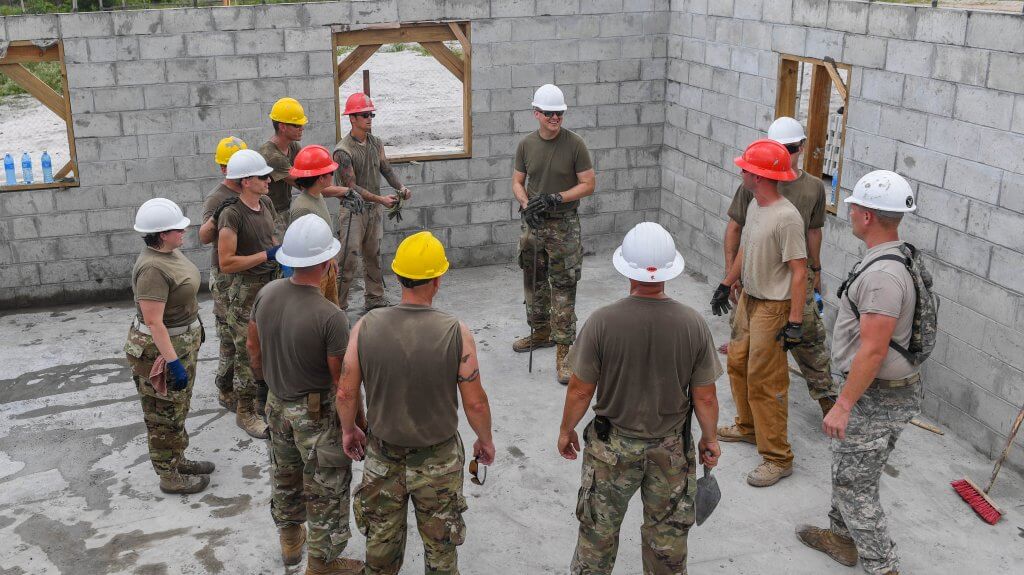Building camaraderie, growing community and eating iguana have all been part of a typical day for soldiers, like Army 2nd Lt. Gabriel Kern, who are taking part in the New Horizons training rotation to Guyana.
Kern, who is part of the 276th Engineer Company from Pierce City, Missouri, joined the Army National Guard later in life at the age of 34. He was driven by the opportunity to participate in missions and training, and the recent exercise has not disappointed. Arriving in Guyana in June, his initial impression was the mission would be impactful.
“They don’t have a lot of infrastructure down here, and I could tell by our one-and-a-half-hour ride from the airport out here that a new building is a really big deal, especially one that’s built to standard and will last,” Kern said. “ … I realize why the military was putting so many resources down here because it really is a really good humanitarian mission.”
New Horizons 2019 is a training exercise to build community centers, clinics, renovate buildings and conduct medical readiness training. Roughly 500 U.S. service members are responsible for the projects, including personnel from the National Guard and reserves.
Kern serves as the platoon leader of the second of four rotations, with his primary responsibility keeping 22 soldiers – including himself – on task to construct community centers by laying cinder blocks.
“We’ve been 100% focused on masonry work, checking symmetry, making sure everything is done to standard under the project manager and learning a lot from our mistakes along the way,” he said.
A typical day starts with departing the base at 0600 to receive briefings on the job site from project managers, while working in partnership with Guyana Defense Forces. By nightfall, soldiers complete the tasks of the day and head back to their temporary quarters to play games like Monopoly or Spades.
Local reaction to Americans on the ground has been “overwhelming positive, very curious, very gracious and very thankful,” Kern adds, and he has gotten to experience some firsts.
“They [the Guyanese people] come by almost daily selling us fresh pineapple, hushpuppies – fresh-brewed – really, really good stuff. I’ve also had iguana for the first time in my life,” he said. “It’s just some exotic experiences.”
A number of factors go into choosing which host nation to devote resources to, which includes needs of the population, training benefits and cost, according to the New Horizons Public Affairs Office. Once Guyana was chosen, the local government prioritized a list of proposed medical and construction projects.
Kern explains that even though there have been challenges, like learning the hard way that something was constructed wrong and having to start over, this is what soldiers join the military for.
“You enlist in the military to go travel and do stuff, and this is the exact example of it – both the work and impact, and then the camaraderie we have in our down time,” he said. “It has been a massive training experience that we will never forget.”
The tropical terrain has also given soldiers the chance to work with citizen airmen, like Air Force Tech. Sgt. Jovanna Diaz from the 315th Security Forces Squadron, 315th Airlift Wing. She is on the ground as part of security forces, initially arriving in April.
She describes the landscape as vibrant with green, but also saturated with very friendly locals who take pride in their country.
Diaz enlisted in 2009 after asking herself ‘how can I give back.’ Her role in Guyana has allowed her to compare notes with the GDF on training, policing techniques and different tactics.
“They’ve talked about the differences of their schooling and how they do things, and how we do things. Some things are similar and some things are different,” she said.
Though there have been some areas to overcome, such as language barriers, she says there is tremendous value in the personal connections.
“We can send the resources all on their own but there’s no personal connection. No personal touch,” she said. “So if I go out to a site and I help their defensive forces with some sort of tactical way to approach something, not only do they have the information and see how we do it, but they have a name to it. They can say, ‘I remember Sgt. Diaz, and Sgt. Diaz said this is why we do it and this is why it’s more effective’.
I think a hands-on approach and putting a face to something is more valuable than just a piece of paper of something you send over,” Diaz explained.
Kern adds that his soldiers have discussed frequently just how this experience has reminded them of the abundance of resources they have access to in the U.S.
“All of us have talked about it in our down time, how grateful we are to have what we have – things we take for granted that we can see the people don’t have or have to repurpose things, which makes building things a lot harder. So that’s been almost a daily discussion about, doesn’t matter how bad we think some things are back home, we have a lot to be grateful for. Very much on our mind.”
The New Horizons 2019 exercise in Guyana is expected to be completed by the end of August.

